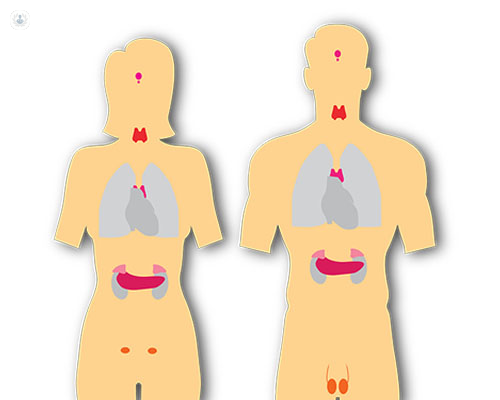Hyperparathyroidism: what you need to know
Autore:
Hyperparathyroidism is a condition in which the parathyroid gland becomes overactive. In his latest article, revered consultant general surgeon Mr Sudeendra Doddi explains the causes, symptoms and treatment of this condition.

What is the function of the parathyroid gland?
As the name suggests, the parathyroid glands are located just under the thyroid gland in the neck. We have four parathyroid glands, with two on each side. They are normally very small, but play a very important role. They produce a hormone called the parathyroid hormone, which is responsible for the regulation of calcium levels in the blood.
What are the symptoms of an overactive parathyroid gland?
Occasionally, the parathyroid glands become enlarged and produces too much parathyroid hormone. If this happens, the calcium in the blood increases. Calcium is taken from the bones, making them weak and brittle. Calcium is also deposited in the kidneys, which can result in kidney stones. Due to the high amount of calcium in the blood, there is a tendency to pass a lot of urine and feel tired. Mood changes, joint aches and brain fog are also symptoms.

How are parathyroid gland disorders diagnosed?
There is growing awareness of high calcium in the blood due to an enlarged parathyroid. This condition is called hyperparathyroidism. The first step is to make a diagnosis. This is done by measuring the amount of calcium in the blood, along with the amount of parathyroid hormone.
The second step is to locate the enlarged parathyroid gland with the use of a nuclear scan and an ultrasound. Then we check if there is any end organ effect from the high calcium. This mainly involves doing a bone density scan to assess the bone health of the patient. An ultrasound is also done of the kidneys to ensure there are no silent kidney stones.
How are parathyroid gland disorders commonly treated?
Once we have a diagnosis of hypercalcaemia due to primary hyperparathyroidism, the recommendation is to offer surgery, especially in young people who have no symptoms or end organ effects. This is to prevent long-term effects on the bones, kidneys, heart or blood vessels.
I always do the surgery under general anaesthetic. To ensure the integrity and safety of the nerves, I use nerve monitoring and nerve stimulation. Once we have located the enlarged parathyroid gland, we always check the opposite side as well, because in 15% of cases, there is more than one enlarged gland.
Mr Sudeendra Doddi is a highly-revered consultant general surgeon based in London, Orpington and Beckenham. If you would like to book a consultation with Mr Doddi you can do so today via his Top Doctors profile.


